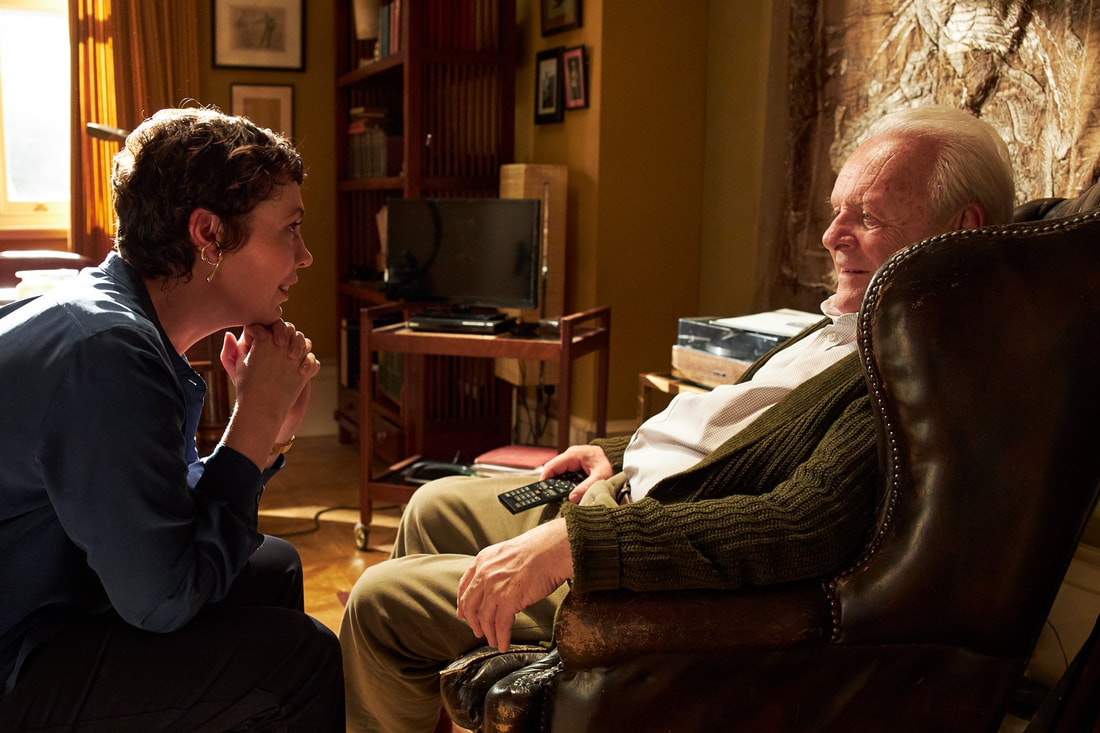The Father follows the story of an elderly Welshman as he struggles with the increasingly bleak effects of dementia. Anthony Hopkins, at the age of 82, gives the performance of a lifetime as the film’s protagonist, Anthony. Despite being in nearly every frame of the taut 97-minute runtime, he constantly reveals new layers to his character. In a particularly astonishing sequence of the film, he enters a room and charmingly wins over a potential caretaker, before launching into a merciless tirade against his eldest daughter (who is in the room with them), lambasting those who he believes are trying to tear him away from his beloved flat, and then curtly dismissing the shocked young woman. Hopkins is a master like no other of the mood shift. Throughout his career, he has been able to swing the tone of conversations with a single look or line, and that remarkable power is in full display here.
Although this film could likely have functioned just off Hopkins’ devastatingly empathic performance, the rest of the crew rises to the challenge of matching him. Olivia Colman is reliably fantastic in the role of Anthony’s eldest daughter, Anne. She is caught between a rock and a hard place. She loves her father and respects his drive for independence, but she can no longer see him continue down a path where he can genuinely no longer function on his own. Anthony’s caretaker Laura, played by Imogen Poots, also finds it difficult to deal with his mercurial disposition. She resembles his youngest daughter (and favorite, as he makes no secret of), he says, but he can switch between doting on her to rejecting her on a dime.
This, in fact, is the greatest strength of the film. Although we have seen many films centering around memory loss, many of them were from the perspective of a loved one or caretaker. Zeller places us squarely into Anthony’s perspective, and we see how his world is crumbling around him. Despite his protestations that he can live independently, we see him, again and again, flailing about to find some constant he can tether himself to. Everything which he takes for fact - the appearance of his daughter, the identity of her husband, the whereabouts of his wristwatch - is revealed to be something entirely unknown. He cannot even take time as a constant. What he believed to be 8:00 AM was, in fact, 8:00 PM. Or was it? Zeller’s editor, Yorgos Lamprinos, is an invaluable contributor here. The presence of cuts is nearly invisible as we wander around this labyrinth of unreliable memory along with Anthony, unsure of what is real or false anymore.
Zeller, however, is not even content with the nonlinear temporal shifts or the excessively unreliable narration. He embraces the medium of film and pushes it to its boundaries. With no foreshadowing, he changes the space of Anthony’s flat itself. The living room, the kitchen, the doorway, and every other feature in the house can change in an instant. Anthony believes he is living in his own flat, but then why is his daughter’s husband saying he’s living in their flat? He looks out his bedroom window, but why does he see something different today? Every single element of this film - the layout of furniture, the presence of Anthony’s hiding spots for valuables, the color of paint on the kitchen wall - serves to further disorient the octogenarian. While he attempts to fight back at first, and reassert what he knows as the truth, we see him increasingly lose himself in despair as he no longer has the strength to question his surroundings. He knows he is walking a fine line. By questioning the madness around him, he can either assert his independence or convince those around him that he is truly beyond their help. He can see it in their eyes; they question his sanity as he tries to rationalize his surroundings.
The Father, in short, is a truly remarkable feat in filmmaking, as deserving of praise as Memento or Pulp Fiction. In the pantheon of films about dementia, it stands far above its competitors. Reality and fiction, opinion and fact, family and stranger blend together and contradict each other as both the audience and Anthony attempt to orient themselves. Just as we think, ‘Aha, I understand what is going on now,’ Zeller delights in pulling the rug out from under us again in a completely new way. This is the potential cinema has to offer that no other medium can. For 97 minutes, we enter a world which may well be an entirely different reality, and yet is no less precise than our own. Hopkins continues to remind the world why he is one of our greatest living performers, and we look enthusiastically towards what Zeller does next.
Score: ★★★★½ / ★★★★★

 RSS Feed
RSS Feed
